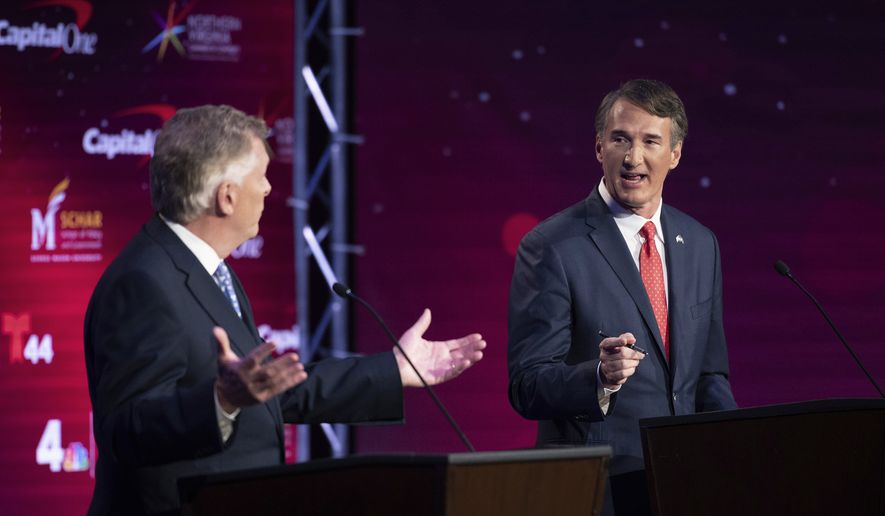Virginia gubernatorial candidates’ competing visions on how to get the state vaccinated are playing a key role in the race, as the COVID-19 pandemic persists.
GOP nominee Glenn Youngkin and Democrat Terry McAuliffe have invoked COVID-19 vaccines in campaign ads, highlighted their plans to encourage Virginians to get the shot and painted each other as being “anti-vaxx” in debates.
But while both campaigns encourage people to get vaccinated, the distinction lies in whether to mandate the shot, as advocated by Mr. McAuliffe, or let those who don’t want it opt out, as promoted by Mr. Youngkin.
J. Miles Coleman of the University of Virginia’s Center for Politics said the issue shows the candidates’ approach to reaching their respective bases while also, for Mr. Youngkin, towing a steady line to reach moderate and conservative voters.
“They have very specific messages with regards to vaccines,” Mr. Coleman said.
The McAuliffe campaign is touting its “Virginia is for Vaccine Lovers” initiative, which would urge schools to require the shot for its personnel and incentivize businesses to mandate the vaccine for employees.
SEE ALSO: McAuliffe counting on Democrats to deliver spending packages before election
A spokesman for the campaign highlighted that the former governor, who served from 2014 to 2018, has called for health care and child care providers to require vaccines for employees and has urged his campaign staff to get fully vaccinated against COVID-19.
Mr. McAuliffe has used his mandate proposals to paint Mr. Youngkin as being an anti-vaxxer who is encouraging people against getting the shot.
“He’s going to send a child to a school where a teacher’s not wearing a mask and a teacher’s not vaccinated? That is disqualifying to be governor,” Mr. McAuliffe said last week in the final debate in Alexandria.
Mr. Coleman said the Democrat is using Mr. Youngkin’s reluctance to issue mandate proposals to paint him broadly as being against the vaccine.
“It’s something that I think McAuliffe sees as something else that can kind of help him nationalize this race,” Mr. Coleman said. “He wants to make the Republican Party the anti-vaxx party.”
Mr. Youngkin, who is vaccinated, has encouraged all Virginians to get the shot and called Mr. McAuliffe’s anti-vaxx attack on him “the most egregious untruth.”
The Youngkin campaign promoted the candidate’s public service announcement encouraging the vaccine while also accusing Mr. McAuliffe of trying to impose more COVID-19 lockdowns and “deny Virginians the right to make their own health care decisions.”
“As Glenn has said, he made the choice to get vaccinated himself and he encourages people to get the vaccine, but it should be left to the individual to make the decision. Glenn is the only candidate that has released a PSA encouraging individuals to get a vaccine and has repeatedly stated that he is vaccinated himself,” said campaign spokeswoman Macaulay Porter.
Mr. Youngkin has cited his resistance to issue a mandate on keeping the labor force in check, saying he didn’t want teachers and health care workers to lose their jobs if they don’t want to get vaccinated.
“I believe everyone should get the vaccine,” Mr. Youngkin said last week on Fox News. “I’m going to work tirelessly to make the best decision for themselves to get it. What Terry McAuliffe wants to do is have companies fire people who don’t get the vaccine.”
Richard Meagher, a political science professor at Randolph-Macon College, said Mr. Youngkin’s stance on vaccines shows the fine line the Republican is treading in his campaign to appeal to a broader base.
Part of Mr. Youngkin’s challenge revolves around the need to turn out both more independent and moderate Republican voters and strong supporters of former President Donald Trump, who may be more resistant to the idea of mandating vaccines.
“It highlights the difference in the makeup between the two parties, and the difficulty in a largely blue state that Virginia is,” Mr. Meagher said. “Just following the Trump base is not enough. It’s not going to give Youngkin the numbers he needs to win the election, so he has to try and find that middle ground.”
More than 60% of Virginians are fully vaccinated against COVID-19, according to the state’s health department.
Nearly 70% of state residents have received at least one shot against the virus.
While the pandemic has played a large role in the race, particularly in the response of how to move forward in the post-economy and prevent further spread, Mr. Coleman said COVID-19 overall may be outweighed by other issues, given Virginia’s steady recovery from the virus.
“We really haven’t had any peaks or spikes with COVID,” Mr. Coleman said. “We’re basically more or less had somewhat of a slow burn, so it may be less of an issue here than in other states that are hit harder more recently by the delta [variant].”
With less than a month until Election Day, polls have indicated the race is tight.
A poll released last week by Monmouth University had Mr. McAuliffe leading with 48%, compared to 43% of support for Mr. Youngkin.
The poll surveyed a random sample of 801 Virginia voters between Sept. 22-26. It had an error margin of plus or minus 3.5 percentage points.
Early voting is currently underway in the state.
• Mica Soellner can be reached at msoellner@washingtontimes.com.




Please read our comment policy before commenting.